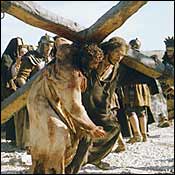LUKE 23:26-32
Jesus carries his cross and Simon of Cyrene was impressed by the soldiers to assist. When I read the details about this I remember that when studying Acts it was mentioned that a certain Simon may actually have been the same Simon of Cyrene. I wouldn't be a bit surprised if what started out as a bad experience wound up being the saving of his soul. William Barclay tells us the history to go with this segment.
When a criminal was condemned to be crucified, he was taken from the judgment hall and set in the middle of a hollow square of four Roman soldiers. His own cross was then laid upon his shoulders. And he was marched to the place of crucifixion by the longest possible route, while before him marched another soldier bearing a placard with his crime inscribed upon it, so that he might be a terrible warning to anyone else who was contemplating such a crime. That is what they did with Jesus.
He began by carrying his own Cross (John 19:17); but under its weight his strength gave out and he could carry it no farther. Palestine was an occupied country and any citizen could be immediately impressed into the service of the Roman government. The sign of such impressment was a tap on the shoulder with the flat of the blade of a Roman spear.
When Jesus sank beneath the weight of his Cross, the Roman centurion in charge looked round for someone to carry it. Out of the country into the city there came Simon from far off Cyrene, which is modern Tripoli. No doubt he was a Jew who all his life had scraped and saved so that he might be able to eat one Passover at Jerusalem. The flat of the Roman spear touched him on the shoulder and he found himself, willy-nilly, carrying a criminal's cross.



No comments:
Post a Comment